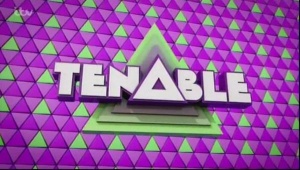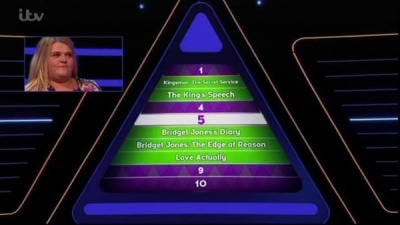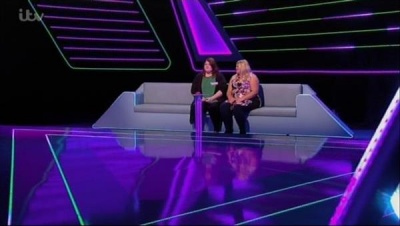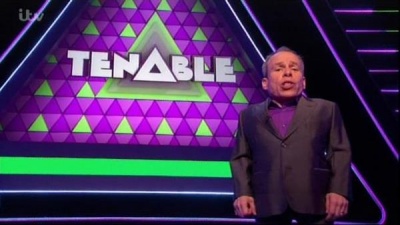Tenable
Synopsis
Teams try to complete top ten lists, with a possible prize of £125,000.
The team gets to see the question, discuss tactics, and then the captain nominates one of their colleagues to play the list. The initial target is five correct answers. This secures the player's place in the final, and adds £1000 to the team prize fund.
Further correct answers will add money to the pot - £2500 for six answers, then £5000, £10,000, £15,000, and £25,000 for completing the top ten list entirely.
Each player has some advantages. They're allowed one incorrect answer. But the player must tread carefully, as a second incorrect answer will eliminate them from the game and lose any money they've won.
Before they reach five right answers, further advantages are available. Three times across the game, the player can nominate a team-member to give an answer, and the player doesn't have to submit this idea. And the captain can buzz in to over-rule one answer in each round, and replace it with one of the captain's choice - both answers are tested against the list.
After all of their team have had a go, the captain takes a turn. Five correct answers will allow the captain to take money, or to buy back players who lost their individual round earlier.
For the final round, the team will take turns to step up and give an answer. An error eliminates that player, so it's useful to have as many brains as possible. Should the team complete the list entirely - all ten answers - they'll win the money.
Tenable does lots of things right. Top ten lists are a welcome change from quickfire trivia: long enough to provide minutes of entertainment, but small enough that we can see the end.
The questions are well-chosen, appropriate for the audience, and avoid survey questions. Some commentators are worried that Tenable will run out of material after a few hundred episodes, as there's only a finite number of fact lists. We're sure the producers will cross that bridge when they get there.
Final lists are calibrated to be challenging and not impossible. When a team only has two players, we can be reasonably sure that they won't be winning big bucks - but never certain, one player knows a lot about a topic and wins big. The first series had five wins in 20 episodes, that feels about right.
There are a few irritating things - a chord progression works up the top ten list every single time, and it gets wearing towards the end of the show. We can sometimes tell a team is not good by the amount of chat and filler at the start of the programme.
The atmosphere is good - teams know each other, they bring their own friendship and in-jokes to the studio. Warwick Davis can harness the existing emotions to make engaging television.
Tenable rated well, attracting almost a million viewers in the difficult 3pm slot.
Catchphrases
"That's an untenable answer."
"You're terrible at Tenable."
Title music
Chris Lewis and Daniel Marantz are credited for Music
Trivia
The show's working title was Tower of Ten.
Graphics by Endemol Shine Design. Recorded at BBC Studioworks in Elstree.
Aired at 3pm, between Judge Rinder and Tipping Point. Its immediate predecessor was Rebound. Late episodes of Deal or No Deal were showing on Channel 4, and Escape to the Country on BBC1.
Yes, we know the show's title is linguistic nonsense. "Ten" comes from the Old English "tien", and lexicographers trace it back to the Sanskrit dasa, Greek deka, and Latin decem. "Tenable" has a completely different root - it's from French "tenir" and Latin "tenere", to hold.
Three special 'All Stars' episodes were made for Sunday evenings in May 2019, complete with a group singing "Tenable! All Stars!" in the theme tune and throughout. One episode, a politicians special, was left unbroadcast - a contestant, Ann Widdecombe (of Cleverdicks fame), had come out of retirement to run in that year's European Elections.





